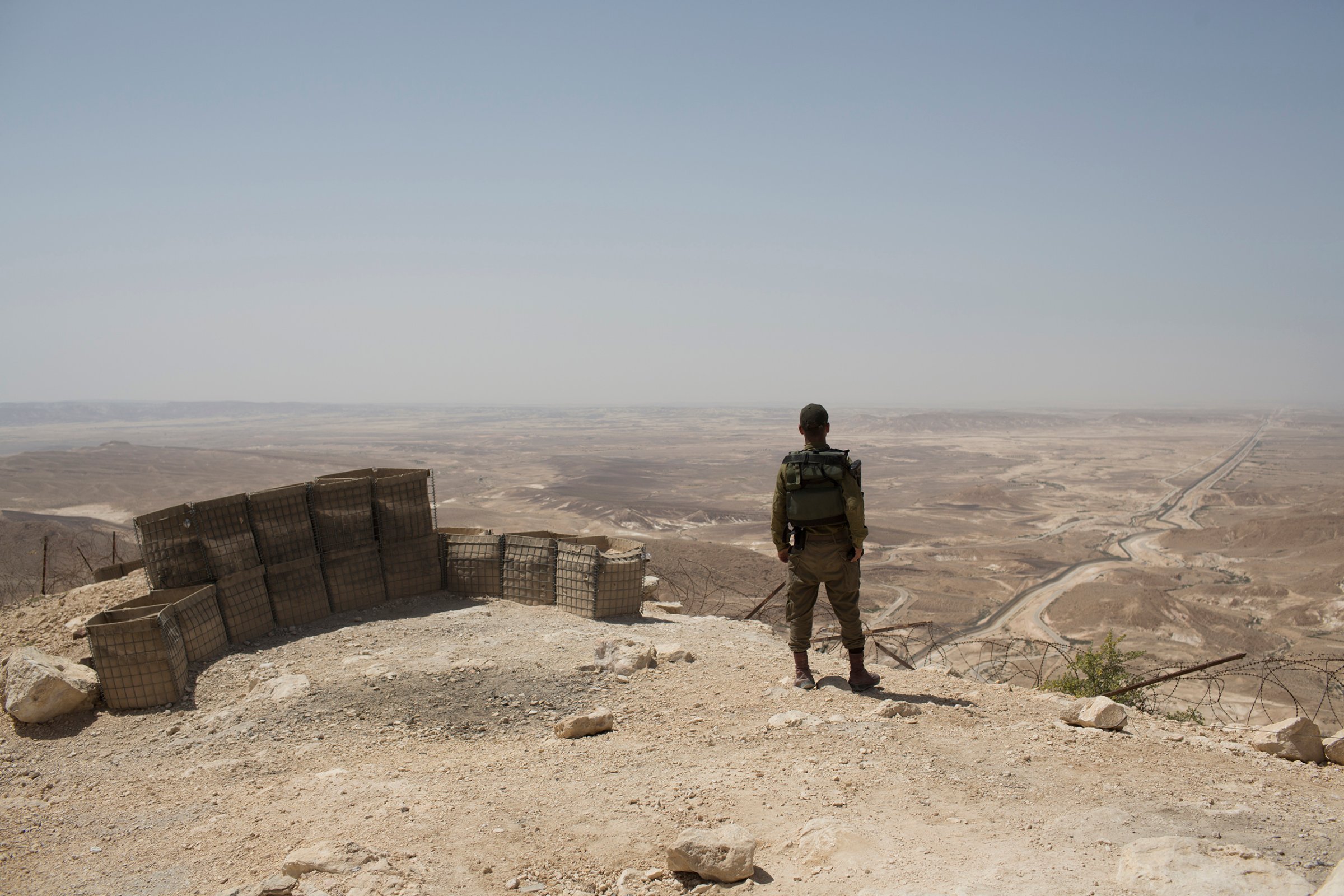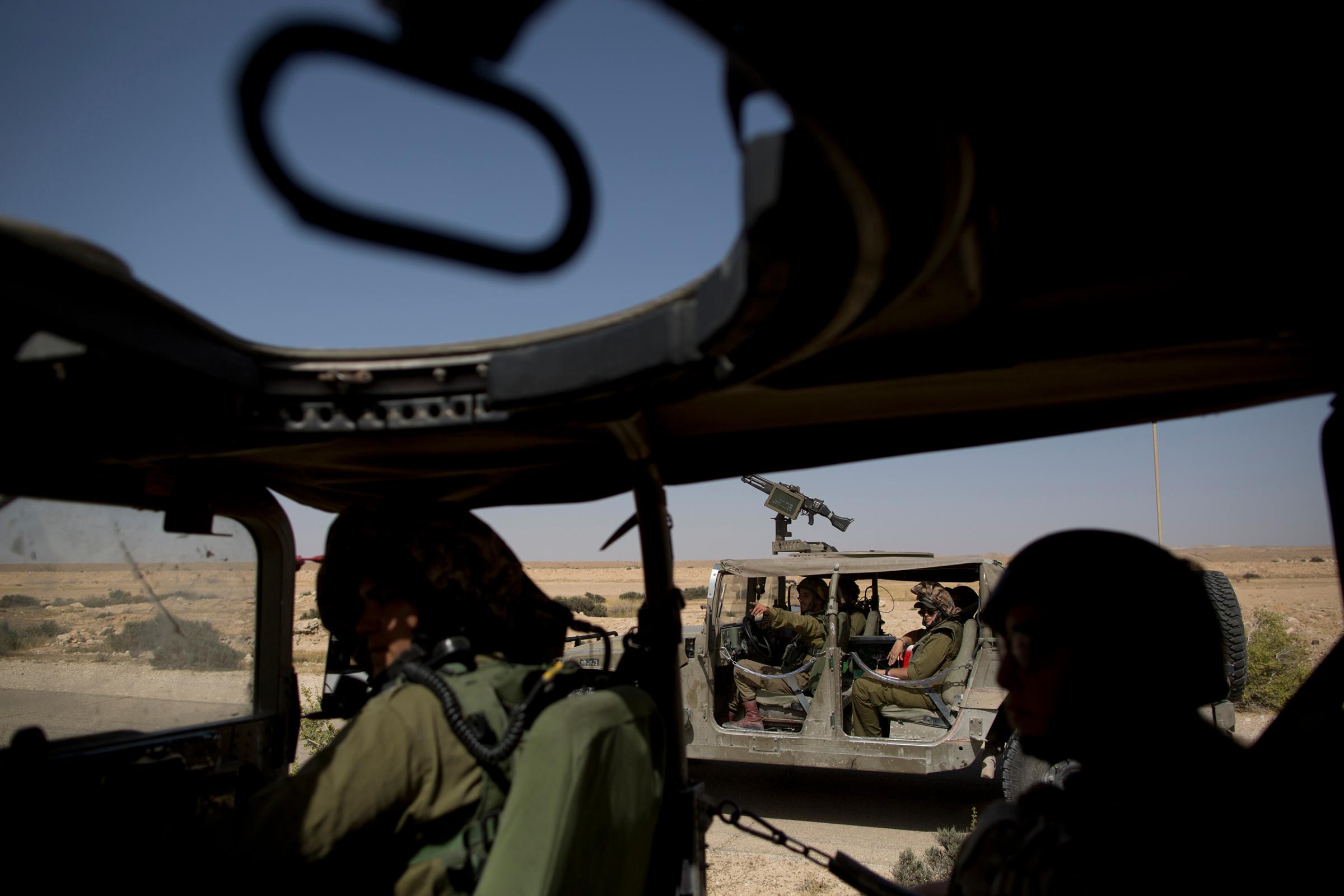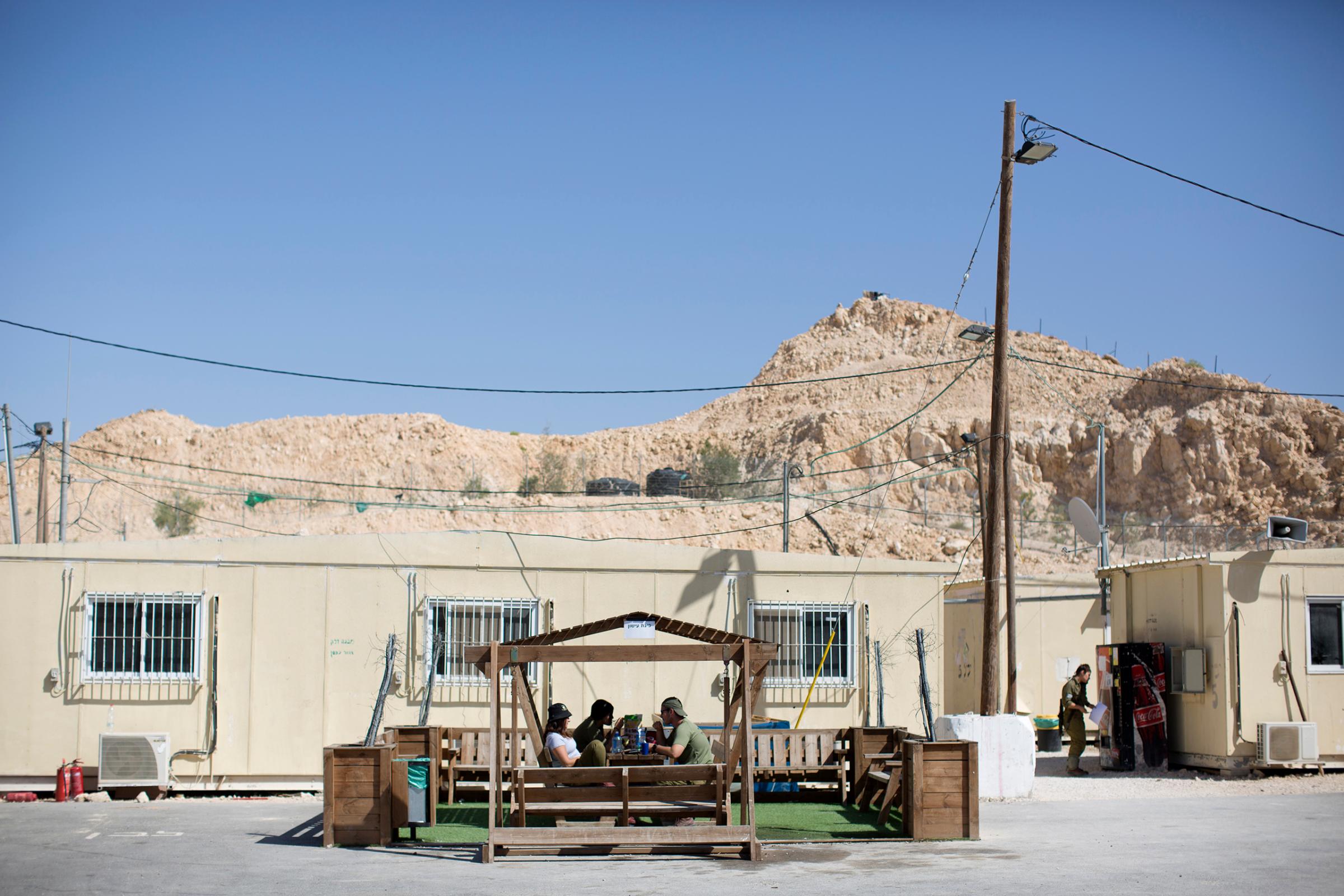
Standing beside a Humvee with a rifle slung over her shoulder, 20-year-old Staff Sergeant Rotem Manzur shields her eyes from the merciless desert sun, and peers out over the 165-mile-long, 16-foot-high border fence separating Israel from Egypt.
About 300 meters from where she stands is an Egyptian soldier standing at his lookout post on the Egyptian side, doing the same thing Manzur is doing: keeping an eye out for ISIS-affiliated militants who have taken over a small part of the northern Sinai Peninsula.
“Look how close they are,” says Manzur, pointing to the Egyptian border post and then to the Israeli road that runs along this side of the fence. “It would be so easy for ISIS to fire on this road,” she says, as she ponders what would happen if gunmen ambushed the Egyptian soldiers, something that has been happening almost daily elsewhere in northern Sinai.
The Egyptian soldier waves at Manzur, who gets back in her Humvee to continue her patrol. She is one of approximately 120 female combat soldiers from the Caracal battalion—Israel’s first co-ed combat unit—who stand as Israel’s first line of defense against Islamist militants in Sinai.
The Egyptian army were once Israel’s adversaries, but the rise and growth of ISIS has brought these Middle Eastern neighbors, whose peace treaty is often seen as a fragile one, much closer.
According to Israeli security officials, Egypt and Israel are now engaged in an unprecedented collaborative mission to prevent the Sinai Peninsula from becoming the next stronghold of ISIS.
“This definitely represents the closest Israel and Egypt have ever cooperated on an intelligence level,” says Avi Melamed, the Fellow of Intelligence and Middle East Affairs at the Eisenhower Institute in Washington D.C. “Israeli intelligence services do not rush to share their information with other intelligence agencies, even if it’s considered a friendly one, and especially not when it’s not friendly.”

Egyptian military activity in the Sinai was until recently prohibited by the 1979 Israel-Egypt peace treaty, which transferred control of the Sinai from Israel to Egypt. This prohibition allowed outlaws of all kinds to operate more easily in the northern Sinai. About three years ago, Israel began permitting Egypt to deploy additional armed forces and carry out air strikes against Islamist rebels, says Melamed, a former Israeli intelligence official. Israel and Egypt are now sharing intelligence, to warn each other of militant activity near the Israeli and Gazan borders.
Prior to the bombing of the Russian jet that exploded over the Sinai desert in October 2015, killing all 224 people aboard, Western security officials paid little attention to the Sinai branch of ISIS. But Egypt and Israel have watched closely as a group of Salafist militants in the Sinai established themselves as Ansar Beit al-Maqdis (Supporters of Jerusalem) following the 2011 fall of Egyptian President Hosni Mubarak, and proceeded to attack Egyptian and Israeli soldiers, civilians, and foreign tourists. In 2011, 13 Israelis and Egyptians were killed in a series of attacks that emanated from northern Sinai. In 2014, three South Korean tourists and an Egyptian driver were killed by a suicide bomber as they waited to cross the Taba border post between Egypt and Israel. Ansar Beit al-Maqdis claimed responsibility.
A few months later, in November 2014, the group gave its allegiance to ISIS, declaring itself the Sinai Province of the Islamic State. Since then, Israeli officials say it has became larger, more organized, better armed, and better trained.
According to an Israeli army intelligence official, ISIS in Sinai has anti-tank missiles, explosive belts, rocket-propelled grenades and IEDs, and its fighters live among the local population and travel through Sinai in armored trucks.
ISIS in Sinai are still in the early stages of development, and haven’t gained control of any major population centers, as they have in Syria, Iraq and Libya, but that could change. According to the intelligence official, there is evidence of ISIS trying to establish Sharia law in some areas. Estimates of their numbers range wildly, he said, from 500 fighters to 5,000.
“It’s tough to identify someone as a member of ISIS,” says the official, because many Bedouin civilians in northern Sinai support the group, providing it with shelter, manpower, and safe passage through their territory. Most of the militants, he adds, are from local Bedouin communities, while some are from other parts of Egypt, and a smaller number may be from Gaza, Sudan and Libya.
While Bedouins are not typically religious, says Shlomo Brom, senior fellow at the Institute for National Security Studies (INSS), they have long felt alienated by the Egyptian government, which they believe has treated them as second class citizens. That resentment was leveraged by extremists when the Mubarak regime and its prison system collapsed.
“When the Islamic radicals that were imprisoned by Mubarak escaped, many of them escaped to Sinai and brought their ideology with them,” says Brom.
Similar to ISIS in Syria and Iraq, the Sinai Province is focused first and foremost on destabilizing the domestic government, so the vast majority of its attacks are aimed at Egyptian forces.
“Their agenda is fighting the Egyptian state and particularly this Egyptian regime, which is considered anti-Islamic because it replaced the Muslim Brotherhood,” Brom says, referring to the military ouster of Mohamed Morsi in 2013.
Northern Sinai has been in a state of emergency since October 2014, when militants ambushed and killed 33 Egyptian security personnel. An attack by ISIS on an Egyptian checkpoint in March killed 13 policemen, and in April, the group killed 15 soldiers and two Egyptian civilians in a single day. Last week, after an Egyptian soldier was killed by a bomb, Egyptian President Abdel Fattah Al-Sisi extended the state of emergency.
In recent months, Israeli security experts say that ISIS has signaled that it’s planning a sophisticated attack on Israel from the Sinai. Threatening messages to that effect have come directly from ISIS headquarters. In a video message released on Dec. 26, 2015, ISIS leader Abu Bakr al-Baghdadi addresses Israel, saying, “We are getting closer to you day by day. Do not think that we have forgotten about you.”

While Israeli security experts say the danger posed by Hamas in Gaza and Hezbollah in Lebanon remains far larger than the challenge from ISIS, the warning is taken very seriously.
“This is a much larger threat than it was a year ago,” says the intelligence official. “We, of course, are not intimidated by ISIS or the Sinai Province, but we take those statements as clues to the timing of the next terror attack.”
Israel and Egypt aren’t the only ones taking precautions. The U.S. is reportedly considering reducing the number of U.S. troops participating in the Multinational Force and Observers, which monitors compliance with the 1979 peace treaty. Defense officials are contemplating ways to automate aspects of the peacekeeping mission in order to decrease the number of soldiers deployed in an increasingly dangerous area.
Until now, it was just intelligence, “but now ISIS is saying it themselves for the first time,” said Captain Ksusha Levin, a 25-year-old company commander who has served in Caracal on the Sinai border for seven years. “We know something will happen,” she says. “ISIS said they will hit Israel on the border. We don’t know what will happen, but we are preparing for when it will.”
More Must-Reads From TIME
- The 100 Most Influential People of 2024
- Coco Gauff Is Playing for Herself Now
- Scenes From Pro-Palestinian Encampments Across U.S. Universities
- 6 Compliments That Land Every Time
- If You're Dating Right Now , You're Brave: Column
- The AI That Could Heal a Divided Internet
- Fallout Is a Brilliant Model for the Future of Video Game Adaptations
- Want Weekly Recs on What to Watch, Read, and More? Sign Up for Worth Your Time
Contact us at letters@time.com